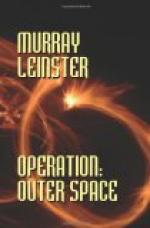Television audiences back on Earth viewed the new planet nearly as soon as did those in the ship. The time-lag was roughly three seconds for a distance of 203.7 light-years.
The surface of the planet was wild and dramatic beyond belief. There were valleys where vegetation grew luxuriantly. There were ranges of snow-clad mountains interpenetrating the equatorial strip, and there were masses of white which, as the ship descended, could be identified as glaciers moving down toward the vegetation.
But as the ship sank lower and lower—and the sound of its rockets became thunderous because of the atmosphere around it—a new feature took over the central position in one’s concept of what the planet was actually like.
The planet was volcanic. There were smoking cones everywhere—in the snow-fields, among the ice-caps, in between the glaciers, and even among the tumbled areas whose greenness proved that here was an environment which might be perilous, but where life should thrive abundantly.
The ship continued to descend toward a great forest near a terminal moraine.
CHAPTER SIX
Jamison declaimed, wearing a throat-mike as Bell zestfully panned his camera and the ship swung down. It was an impressive broadcast. The rockets roared. With the coming of air about the ship, they no longer made a mere rumbling. They created a tumult which was like the growl of thunder if one were in the midst of the thunder-cloud. It was a numbing noise. It was almost a paralyzing noise. But Jamison talked with professional smoothness.
“This planet,” he orated, while pictures from Bell’s camera went direct to the transmitter below, “this planet is the first world other than Earth on which a human ship has landed. It is paradoxic that before men have walked on Mars’ red iron-oxide plains and breathed its thin cold air, or fought for life in the formaldehyde gales of Venus, that they should look upon a world which welcomes them from illimitable remoteness. Here we descend, and all mankind can watch our descent upon a world whose vegetation is green; whose glaciers prove that there is air and water in plenty, whose very smoking volcanoes assure us of its close kinship to Earth!”
He lifted the mike away from his throat and framed words with his lips. “Am I still on?” Cochrane nodded. Cochrane wore headphones carrying what the communicator carried, as this broadcast went through an angled Dabney field relay system back to Lunar City and then to Earth. He spoke close to Jamison’s ear.
“Go ahead! If your voice fades, it will be the best possible sign-off. Suspense. Good television!”
Jamison let the throat-mike back against his skin. The roaring of the rockets would affect it only as his throat vibrated from the sound. It would register, even so.




